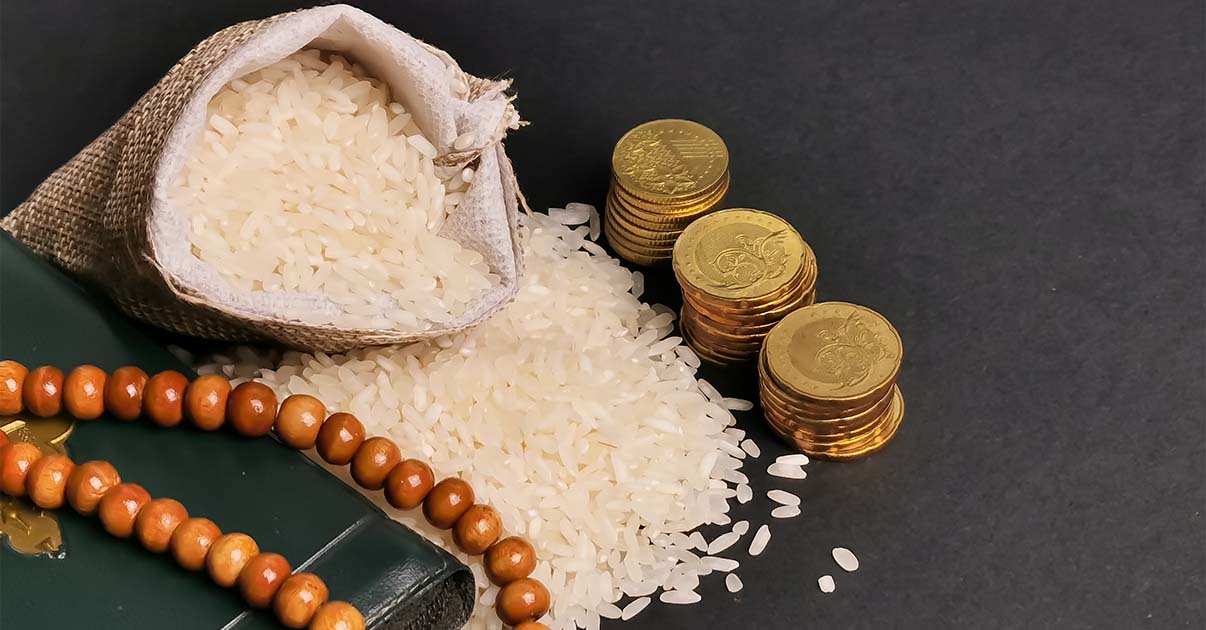Zakat: The Power of Giving
The practice of almsgiving precedes Islam and has been practised by people of different faiths and cultures for thousands of years. In the modern age, we know it as philanthropy, giving to the poor, or charity; which is performed voluntarily.
In Islam however, zakat or almsgiving is an obligatory charitable donation which all sane adult Muslims must pay given that they meet a set threshold. Being one of the five pillars of Islam it’s a promise that Muslims must fulfil to help those who are in need. A verse in the Holy Quran reads:
“And establish prayer and give zakat, and whatever good you put forward for yourselves – you will find it with Allah. Indeed, Allah of what you do, is Seeing.” (Surah Al-Baqarah, 2:110)
But how does zakat work? Are there different types? How much and how often must it be paid? And who should you pay zakat to? If you’re having all of these burning questions then read on as we understand this important pillar.
Understanding Zakat
The literal meaning of the word ‘zakat’ is purity. In his book, ‘Vision of Islam’ William C. Chittick writes the following;
“Just as ablutions purify the body and salat purifies the soul, so zakat purifies possessions and makes them pleasing to God.” (Vision of Islam, p:39)
It is an annual donation made mandatory by Islamic jurisprudence. The payment of zakat applies on all disposable income one possesses. Muslims believe that along with zakat being their religious obligation it purifies, blesses, and increases the remainder of their wealth.
Types
Zakat Al-Malù
Zakat al-mal is the ‘zakat of wealth’. It’s essentially a charity due from a portion of an adult’s wealth accumulated over a lunar year.
Zakat Al-Fitr
Zakat al-fitr, ‘zakat of breaking the fast’, is an amount due by the head of the family (for each member including children and elderly). It is another form of obligatory charity that Muslims pay in order to help the poor to celebrate Eid al-fitr.
Sadqah: The Voluntary Charity
Finally, a voluntary form of charity is sadqah. While zakat is the charity that is made mandatory on Muslims, they are encouraged to make voluntary charity if they will. There is no threshold or a limit to giving saqdah. Whatever a believer wishes to give from their wealth of their own accord is acceptable. Furthermore, sadqah doesn’t necessarily have to be in the form of money. It can be clothes, food, personal belongings, or even acts of kindness.
Nisab: The Threshold
Zakat allows for a smooth transition of wealth between the rich and the needy. For zakat (zakat al-mal) to be fair an individual must be an adult, they have to be sane, and most importantly they need to meet a certain threshold in terms of a minimum amount of disposable income owned for a minimum of one lunar year. Nisab is set to the value of 87.48 gm of gold, or 612.36 gm of silver.
The value of nisab doesn’t change and it applies to all forms of accumulated wealth including savings, precious metals, currency, wealth from conducting business, cattle, or farm produce.
However, for zakat al-fitr the conditions are that it’s to be paid by the head of the family (for every member of their family including the elderly and the children). It is also required that all Muslims must pay zakat al-fitr given that they have one day’s meal for all of their family on the eve of Eid al-fitr.
How Much and How Often is Zakat Paid?
Zakat al-mal has to be paid once every lunar year, however whenever during the year one chooses to pay their zakat is up to them (for example the charity for crops is paid at the time of harvest). The amount due for zakat is 2.5% or 1/40 of accumulated income. This means that the exact amount due will be different for anyone depending on the total value of their assets. This way everyone departs from a portion of their wealth depending upon their independent financial status.
Zakat al-fitr on the other hand, becomes mandatory from the sunset of the last day of fast and must be paid before the Eid prayer at the latest. However, it can be paid prior to this period anytime during Ramadan, in fact, most Muslims are eager to pay their zakat al-fitr as early as possible. They do this in the spirit of Brotherhood so those who are in need of charity can receive it on time and have a fulfilling Eid along with their fellow Muslims. The amount due for zakat al-fitr (per each individual) is equal to the average price of a meal.
Who is Eligible to Receive Zakat?
While sadqah (voluntary charity) can be paid to anyone deemed to be needy, the same is not the case for zakat (obligatory charity). According to the Quran, there are eight categories of people who can receive zakat. A verse from the Quran reads;
“The alms are meant only for the poor and the needy and those who are in charge thereof, those whose hearts are to be reconciled, and to free those in bondage, and to help those burdened with debt, and for expenditure in the Way of Allah and for the wayfarer. This is an obligation from Allah. Allah is All-Knowing, All-Wise.” (Surah At-Tawbah, 9:60-66 )
According to the verse the following eight categories can be identified:
- The poor (al-fuqara).
- The needy (al-masakin).
- Zakat administrators (charities).
- Friends of Islam/new Muslims (converts).
- Those under debt.
- In the way of Allah.
- Captives and slaves (free those in bondage).
- The wayfarer (a traveller or someone who is lost or has limited supplies available).
It’s important to note that the mandatory zakat can not be paid to the descendants of Prophet Mohammad (PBUH) even if they fall within the above-mentioned categories. The same condition applies for non-muslims as well.
That being said, it’s acceptable to offer any other form of help to them either monetary or non-monetary.
Conclusion
Zakat forms an essential part of the Islamic faith and the Islamic financial system as well. People prefer to pay their due zakat, especially during Ramadan in order to maximise their reward. In its essence, zakat is a beautiful and seamless system of distributing wealth throughout the community. It’s a unique form of taxation that both helps those in need and offers a reward to the one who gives.
Head over to our blog to learn more about Ramadan, we explore many exciting topics like what Ramadan looks like in space!


